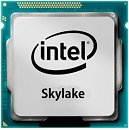- Joined
- Oct 9, 2007
- Messages
- 47,535 (7.47/day)
- Location
- Hyderabad, India
| System Name | RBMK-1000 |
|---|---|
| Processor | AMD Ryzen 7 5700G |
| Motherboard | ASUS ROG Strix B450-E Gaming |
| Cooling | DeepCool Gammax L240 V2 |
| Memory | 2x 8GB G.Skill Sniper X |
| Video Card(s) | Palit GeForce RTX 2080 SUPER GameRock |
| Storage | Western Digital Black NVMe 512GB |
| Display(s) | BenQ 1440p 60 Hz 27-inch |
| Case | Corsair Carbide 100R |
| Audio Device(s) | ASUS SupremeFX S1220A |
| Power Supply | Cooler Master MWE Gold 650W |
| Mouse | ASUS ROG Strix Impact |
| Keyboard | Gamdias Hermes E2 |
| Software | Windows 11 Pro |
Intel pushed a CPU microcode update to its motherboard partners, which "plugs a loophole," which allowed people to overclock Core "Skylake" processors, other than those with the "K" brand extensions. The PC enthusiast community rejoiced what it felt was a comeback of base-clock overclocking on non-enthusiast Intel chips, with the advent of the company's 6th generation Core "Skylake" architecture. Apparently, Intel sees it as a flawed CPU micro-code which allowed overclocking, and which some motherboard vendors even built marketing campaigns around.
In an interview with PC World, a company spokesperson stated: "Intel regularly issues updates for our processors which our partners voluntarily incorporate into their BIOS," an Intel spokesman said. "The latest update provided to partners includes, among other things, code that aligns with the position that we do not recommend overclocking processors that have not been designed to do so. Additionally, Intel does not warranty the operation of the processor beyond its specifications." So how does this micro-code update work? For starters, it will work only if you want it to. If your motherboard currently supports overclocking, then it will continue to do so, until you update its BIOS. Intel will push the new micro-code to its motherboard partners, who in turn will deploy it on their latest production batches, and to their customers through DIY BIOS updates.

View at TechPowerUp Main Site
In an interview with PC World, a company spokesperson stated: "Intel regularly issues updates for our processors which our partners voluntarily incorporate into their BIOS," an Intel spokesman said. "The latest update provided to partners includes, among other things, code that aligns with the position that we do not recommend overclocking processors that have not been designed to do so. Additionally, Intel does not warranty the operation of the processor beyond its specifications." So how does this micro-code update work? For starters, it will work only if you want it to. If your motherboard currently supports overclocking, then it will continue to do so, until you update its BIOS. Intel will push the new micro-code to its motherboard partners, who in turn will deploy it on their latest production batches, and to their customers through DIY BIOS updates.

View at TechPowerUp Main Site




